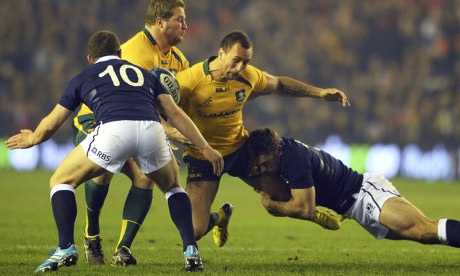
Australia started the week in the capital of the Scots on the rocks after yet another instance of players being found under the influence but ended it in higher spirits after two moments of inspiration again proved the difference in a contest between the hemispheres. Scotland came closer to scoring a try than they had against South Africa six days before, skills and composure melting in the heat of the moment.
Graft lost out to craft. Scotland had the bulk of the possession and Australia had to make nearly twice as many tackles as their hosts, but the match was a summary of the men in blue's travails in the past few years, loving labour but losing. They at least achieved more width than they had against the Springboks, but on the few occasions they made ground basic errors cost them.
Australia threatened Scotland's line twice and turned the opportunities into 12 points. First Quade Cooper's inside pass to Israel Folau left the full-back with an unopposed 25-metre run to the line on 26 minutes and then, three minutes after the break, quick passing and changes of direction created space out wide for the wing Charlie Feauai-Sautia, who was only playing because of the bans imposed on Adam Ashley-Cooper and Nick Cummins for their part in the Dublin drinking session the week before, to elude the challenge of Sean Maitland.
Scotland had more opportunities, but the closer they came to Australia's line, the more desperate they became. They should have gone into the interval ahead when, after Greig Laidlaw's fourth penalty, on 36 minutes, had reduced the visitors' lead to a point, Maitland broke from deep in his own half to reach the opposition 22.
He had Sean Lamont outside him and two defenders to beat. Opting not to continue his run and keep the tacklers in two minds, the Lion passed early and slightly clumsily to the wing who had to check his stride enough for Folau to be able to bring him down just short of the line. When Scotland recycled the ball, eventually, Lamont and Kelly Brown were among four players to try to force their way through before the No8, David Denton, dropped the ball in contact and Australia escaped.
When Australia extended their lead with their second try, Scotland had an immediate chance to respond. They worked a clever move from a lineout 40 metres out and Laidlaw scurried through a wide gap. As he approached the Australia 22 he passed to Grant Gilchrist outside him, who promptly dropped the ball. The closer they came, the further they seemed away.
Australia, after a dreadful week in what has been a dismal year, were not the markedly superior side, merely the cooler one. Immediately after Gilchrist's lapse, Scotland were handed a prime opportunity when the Australia second-row Rob Simmons was sent to the sin-bin for twice sending back-handers into the face of the prop Moray Low.
If the sanction, imposed on the advice of the television match official, was merited, the referee Jaco Peyper invited the lock to impose his own justice by failing to crack down on persistent infringing at the breakdown by both sides. The South African awarded 15 penalties in the first 35 minutes but, while he warned the two captains, he failed to bring out his yellow card and the game was far more stop than go.
Low had positioned himself on Australia's side of a ruck and was holding Simmons's jersey to help create a hole for a Scotland runner to exploit. The home ball-carriers needed all the help going, but the prop should also have been given 10 minutes off for an act as cynical as Simmons's was rash. When Laidlaw kicked the resulting penalty, Australia were 18-15 ahead and would be a man light for 10 minutes.
The only other score in that period came from the boot of Christian Leali'ifano, his third and final penalty. He could not miss in the summer when the Lions were down under but he wasted three opportunities to kill the game in the final quarter. It did not matter because, when they had to, Australia had the ability to raise their game, in defence and attack.
Scotland were more aggressive than they had been against South Africa, as if believing their chance of victory was better than slight, and the crowd roared them on at the start of the game and at the end when, with four minutes to go, Scotland had a lineout in Australia's 22.
It was an opportunity to win the game but it was Australia who stepped up to the moment, contesting the lineout and winning both the ball and a penalty. If they had gone long periods without possession, were particularly poor at restarts, and were content to give away penalties at the breakdown – five of which Laidlaw converted – they knew what to do when it mattered.
Yet it said something for the condition both teams are in that no points were scored in the final 30 minutes. Australia, by then playing for territory, were looking to deal in three-pointers while Scotland had to go for seven, something neither side was comfortable with. Both could do with time to reflect, but Australia have one more match this year, against Wales in Cardiff on Saturday.
They had a midnight curfew after beating Scotland – no drinking in the local atmosphere here – and three victories in a row is their best run this year, but it is a long time since an Australia team has looked so vulnerable and unexceptional. Scotland will long rue a wasted opportunity.

